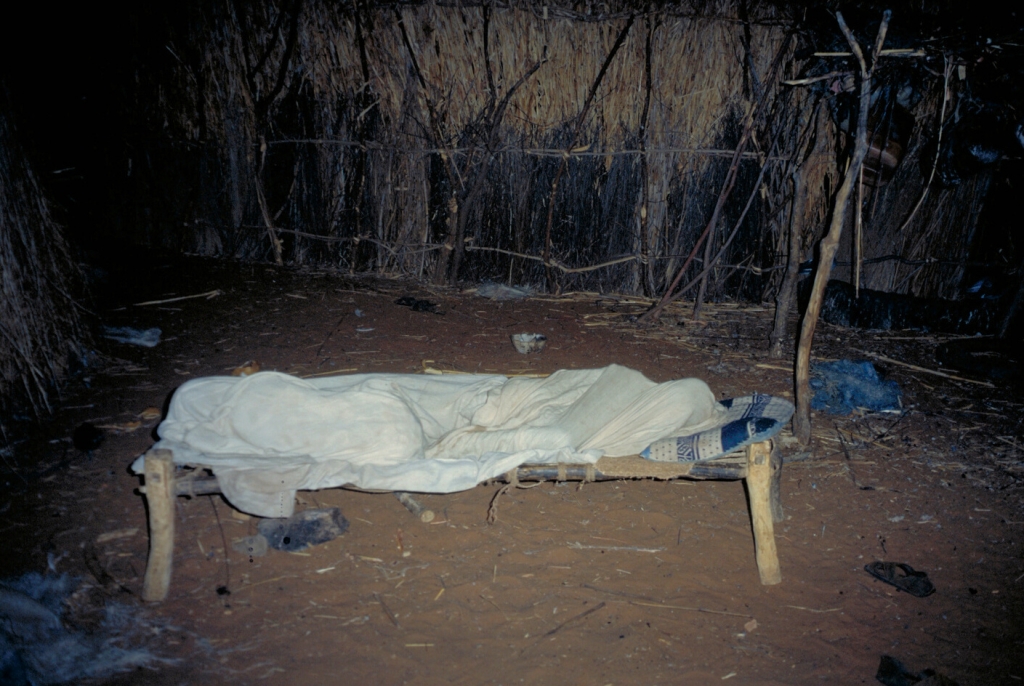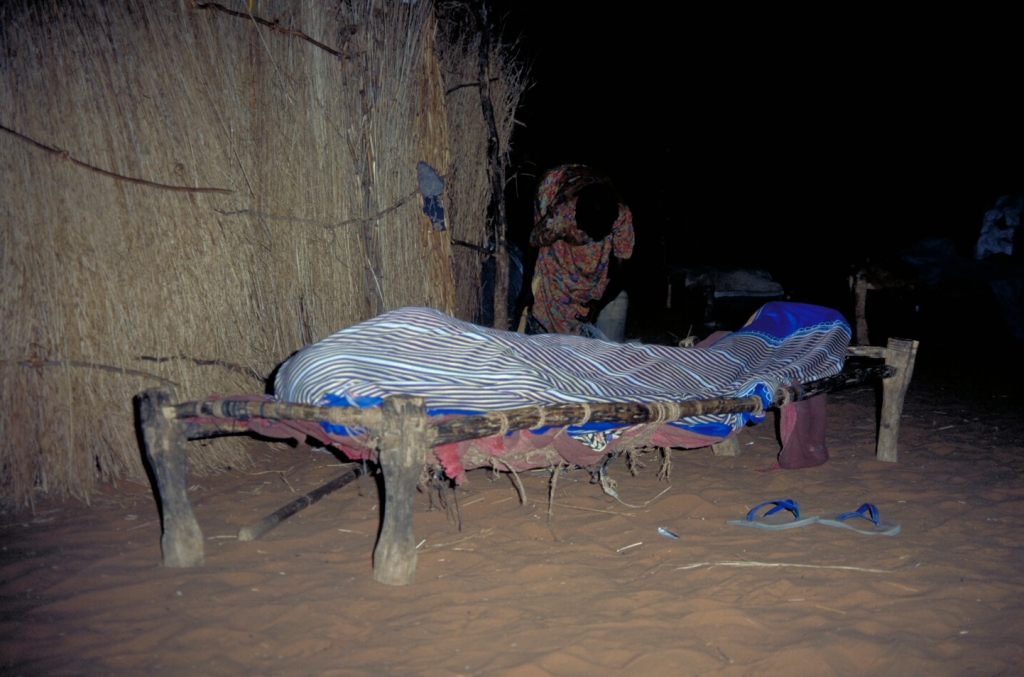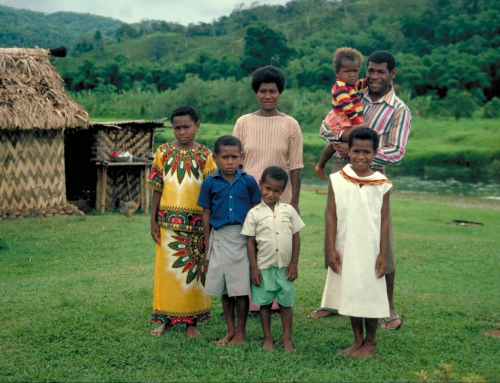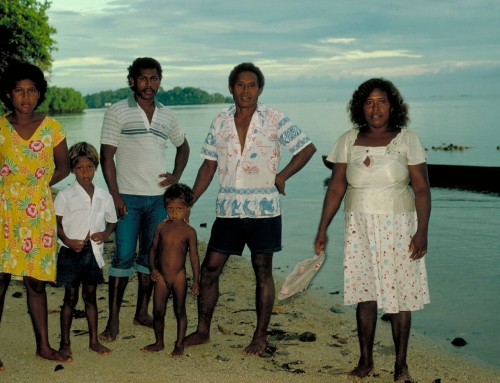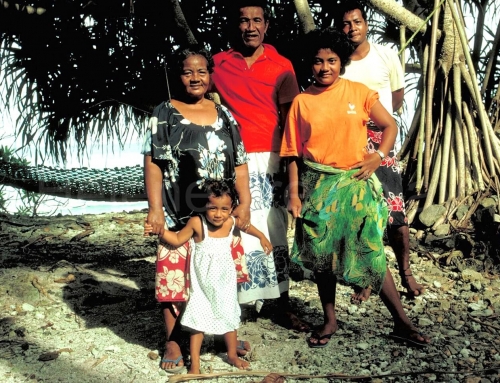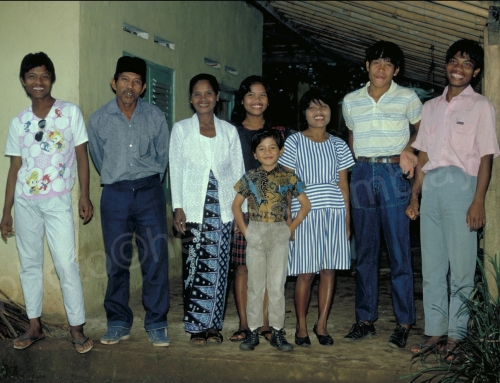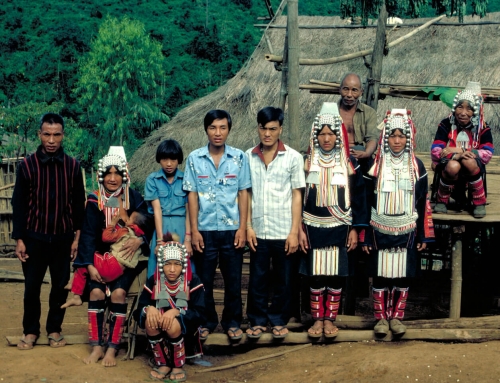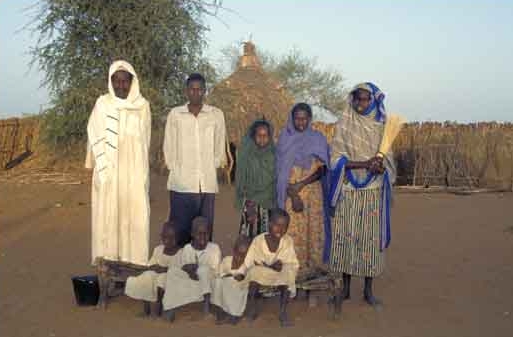
Two goats
One donkey
Two hens and their chicks
One dog
Seven pigeons
Mohamed Khamis Tibeig’s family
Mohamed Khamis Tibeig, 48
Omum Eid El Riah, 35
Adam Mohamed Khamis Tibeig, 19
El Fatih, 17, a working boy
Bakhita, 15
Harron, 13
Amna, 11
Elzibair, 9
Saif, 7
Nasel-Elsin (Nasr-Eldin?), 5
Elfadil (died three days after birth)
Names have meaning: Khamis was born on a Thursday. Omum Eid was born
during the Eid feast.
Djohame village
April 24
The coolness of early morning
5:15 Birds, dogs and roosters are calling in the day at the villages of North Kordofan. His family still asleep in the yard, Mohamed Khamis Tibeig heads to the empty man’s hut to say his morning prayers. Five minutes later he grabs his handmade bed in the yard and brings it between the kitchen and the pigeon’s cage.
This is where he sits waiting to be served his morning tea. It will take some time but here he is assured of the short coolness of the early morning hours. If the nights are so perfect, the days are hot and temperatures will rise fast to nearly 50 degrees.
5.30 Bakhita walks about brushing her teeth. Then with a can of water in hand, she heads towards the goat area for her morning needs. As fetching water is her duty, Amna readies the donkey to go to the well.
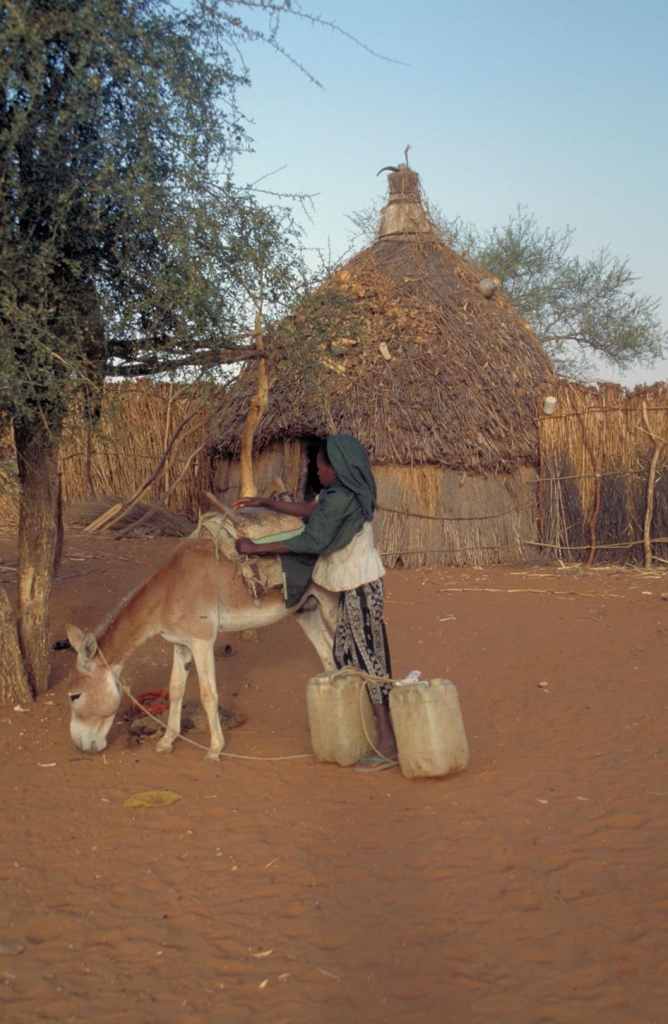
Use as little wood as possible
5:50 Even if it’s her daughters’ duty to do all the housework, Omum shakes her small sons sleeping together on a plastic sheet on the sand near the kitchen hut. In silence Saif sits on the floor in the kitchen sleepily watching his mother make tea. Omum is burning a few branches and taking the coals to put under her water jar. Cooking wood is scarce so she makes sure to use as little wood as possible. El Fatih and Elzibair join their father, waiting with him to be served.
His son has been seen alive
Two of Mohamed Khamis’s family are absent. Adam, the eldest son, has found work at a private orchard about forty kilometers away, harvesting guava, mango, tomatoes, and lemon. Harron is employed looking after grazing cattle and has not been seen for 14 months. “He is working for a good Muslim,” Mohamed Khamis says of the farmer who employs Harron and, most important, he has been seen alive by villagers who have come here to tell him. By now, however, his parents are looking forward to his visit. “We do not worry but if he does not come soon I will go and check on him,” the father says.
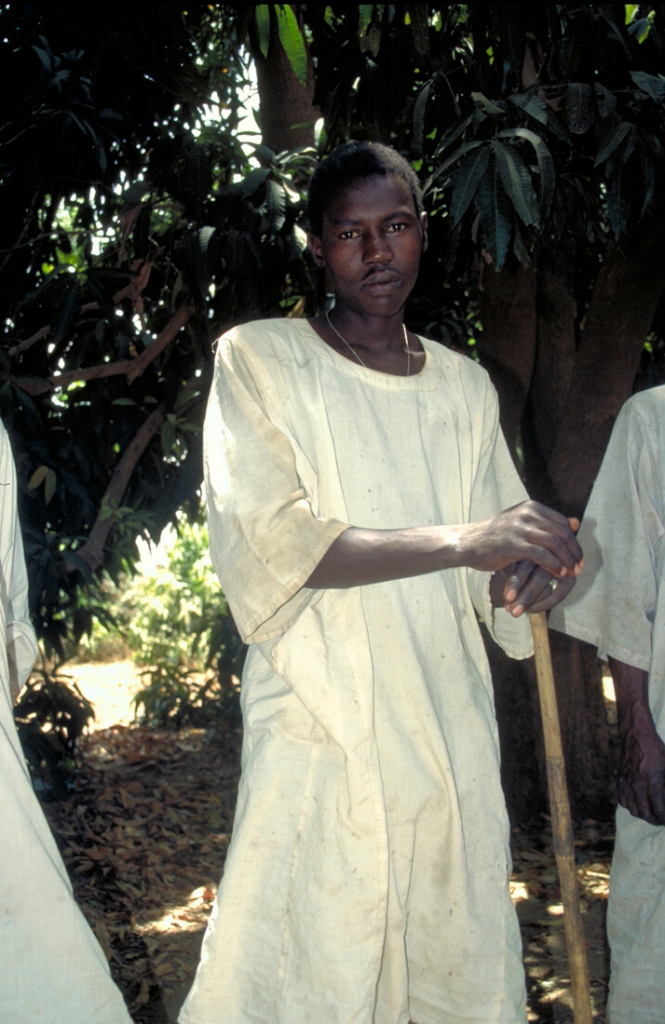
The village of Djohame, nine kilometres inland from the main road that leads to El Obeid, is a still, lonely and very quiet place at this time of morning. The first cattle-keeper is walking out towards no man’s land while a lonely rider travels on his camel in the dry savannah.
Two hours to bring the water back home.
Without tea, and with her jerrican-packed donkey, Amna heads east towards the trails to the wells. From the paths that flit about the village, the other boys and girls with whom she travels every morning come to join her. It will take two hours to bring the water back home.
She says she fights back every day.
There are four pumps, of which three are functioning. The fourth pump has not been bought yet. The imam who came in this isolated village to serve Allah and teach them the Coran, paid for the digging of two wells the villager’s agreeing to pay for the and pomps. They invested in one but are still postponing the investment of the second leaving still long queus at the wells.
Amna, places her plastic jerricans by one of the water-pumps as she waits for her turn. She keeps her eyes on them, and with a struggling personality, she confronts the big boys who want to push her containers to take her place in the line. Amna says the boys are always like this with the girls at the well. She says she fights back every day.
The nomadic pastoral people who have been grazing their animals in Sudan for ever are already there. They take turns filling their numerous containers, some of which are dried goat stomachs, watering their cows, goats and then their camels so as not to return for two or three days leaving the pumps free for other numerous nomadic people that have gathered in villages of the region. Desertification and war is making nomadic life more and more difficult.
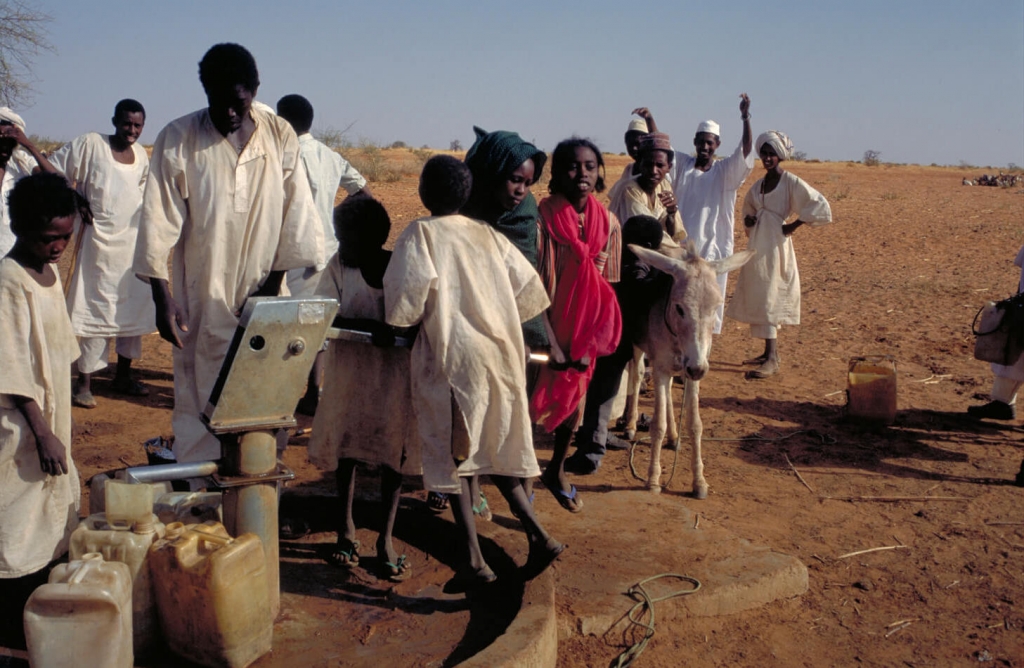
Poorer then his ancesters had ever been
6:45 Ahmed, Mohamed Khamis’s friend arrives at the entry to the yard which brings a big white smile to his face. He gets up to greet him and invites Ahmed to sit on the bed-turned-bench-for-the-day. It’s an old friendship. The two men grazed cattle together when they were young and their fathers had up to 200 animals. Now, with two goats and one donkey, Mohamed Khamis is poorer then his ancesters had ever been.
With the drought coming back year-after-year for the last 14 years in northern Sudan there is little hope that Mohamed Khamis or his sons will ever ever feed as many cattle again as did his father.
Today, after having helped his wife and children do the planting, Mohamed Khamis needs to employ himself on big farms and during the dry season he has become a carpenter and makes beds. His friend has become a merchant — a middle-man who buys cattle from farmers and profits by selling them in the markets. After tea, he asks Mohamed Khamis, whom he trusts, to deliver money to one the village farmers and then is off to his business.
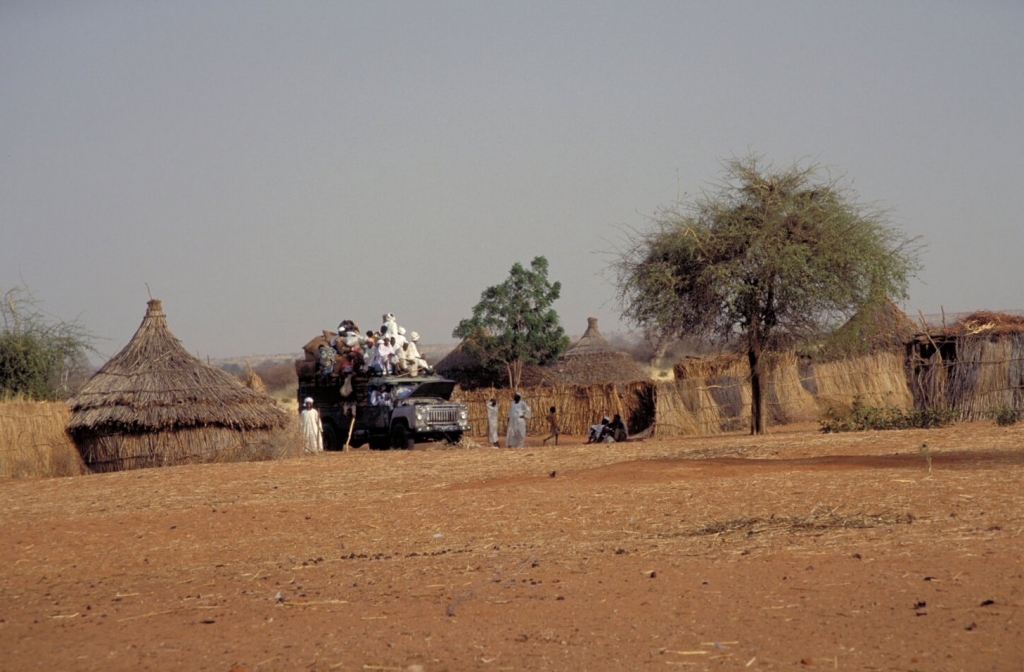
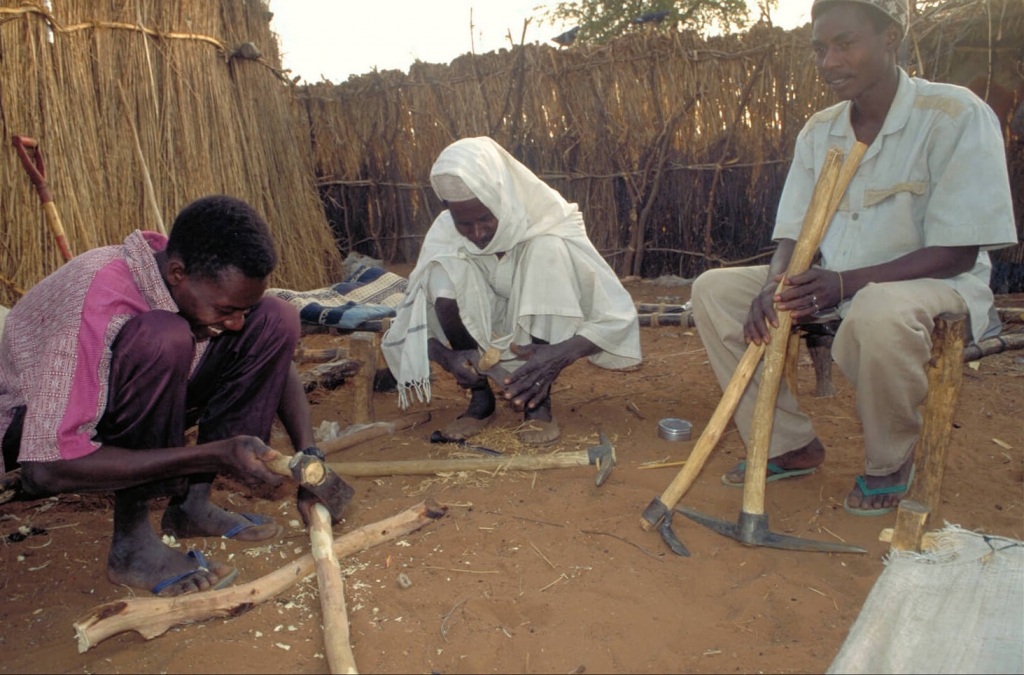
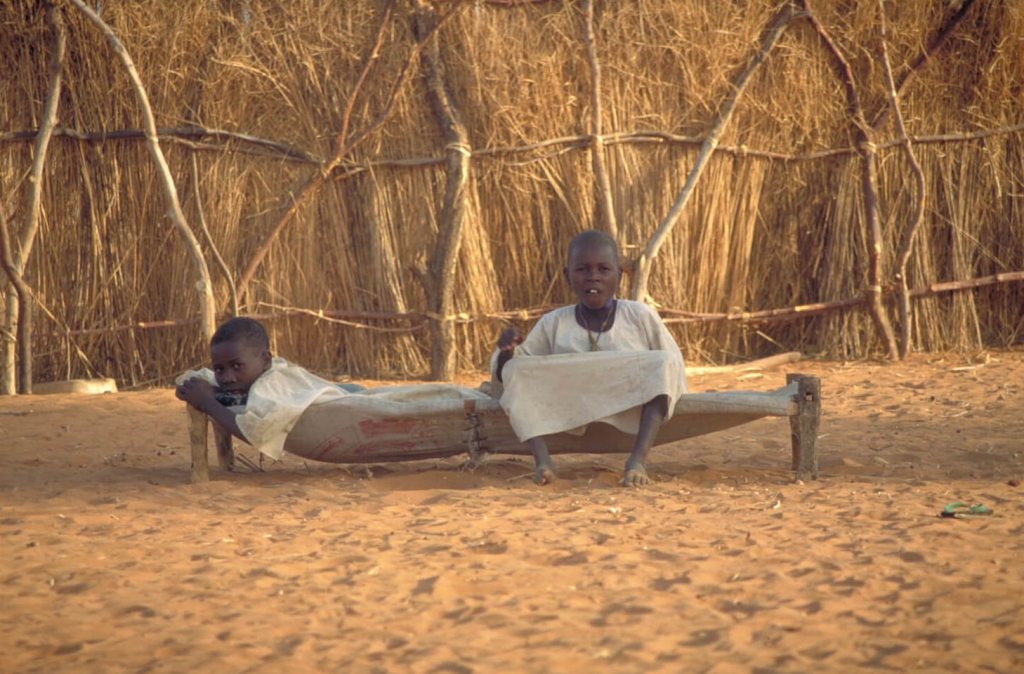
Feeding the children he so much wanted
6:45 Having had his tea, Elzibair follows the path Amna has taken to bring the goats to drink at the well and leaves them for the day. Each goat knows the road and what time to come home at night.
When his friend is gone, Omum Eid El Riah tells her husband, if the family is to eat today, she needs money to get two malwas of sorghum ground. (1 malwa is 3.5 kg) Mohamed Khamis, does not have that much money and is thinking, once again, about the challenge to feed the children he has so much desired.
When he went to Omum’s father to ask for her, she was smaller then Bakhita and a little bigger then Amna. Mohamed Khamis had been already married but divorced that wife because she was not giving birth to any children. After spending a few years alone, he then set his choice on Omum to give him children.
This morning however he will need to borrow to feed them. Yesterday’s small market day in the village of Iajeree was bad. He did not sell one of the two beds he had brought there to sell. The villagers say Mohamed Khamis is a very good carpenter. He builds the beds during these “months of doing nothing” as he calls the lean season from January to April, when everyone waits for the rains to fall and there are no job opportunities. But during these months no one has money to buy his beds.
Khamis finds someone to lend him the money and, after given his wife the exact amount she needs, he walks towards the lorry which is picking up the market-goers to bring them to Abo-Hermaira’s big Saturday market. Omum begins her 90-minute walk to the grinding mill.
Water a daily problem
7.00 El Fatih and Bakhita join the other villagers at the hafir (surface water reservoir) to start the family’s daily quota of work. A pickaxe to dig and two pails to carry the earth are their tools. For the next four hours, they dig stubbornly at the hard dry earth. They are still only at the first level of the eight-step pit and it is important the hafir be finished before the rainy season which is coming soon. The southwest winds, which bring rain usually arrive around the end of April or beginning of May.
Water is a pressing and daily problem here in the chronically food-short and drought-affected regions of North Kordofan, and the idea that they will save the two-hour trip to the wells morning and night gives them the energy and drive to pound and pick and shovel over and over again at the unyielding iron-hard earth.
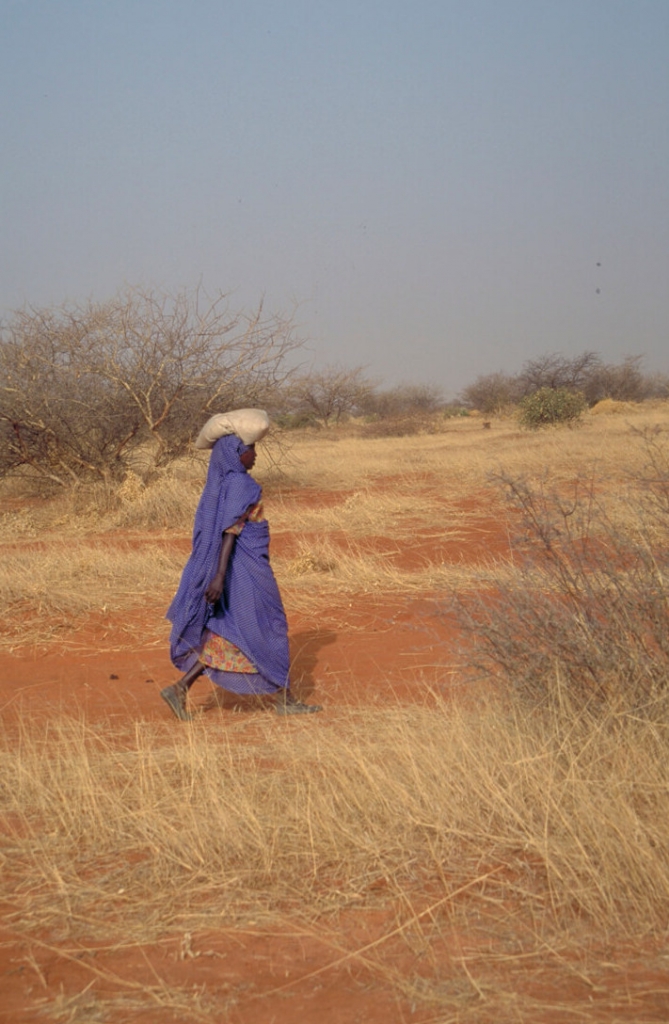
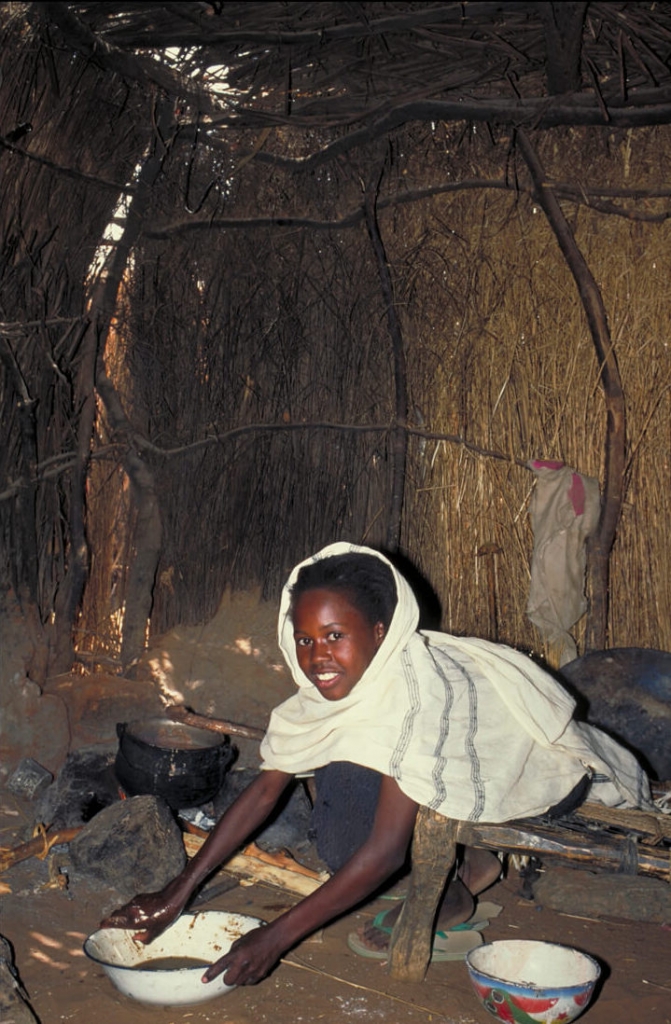
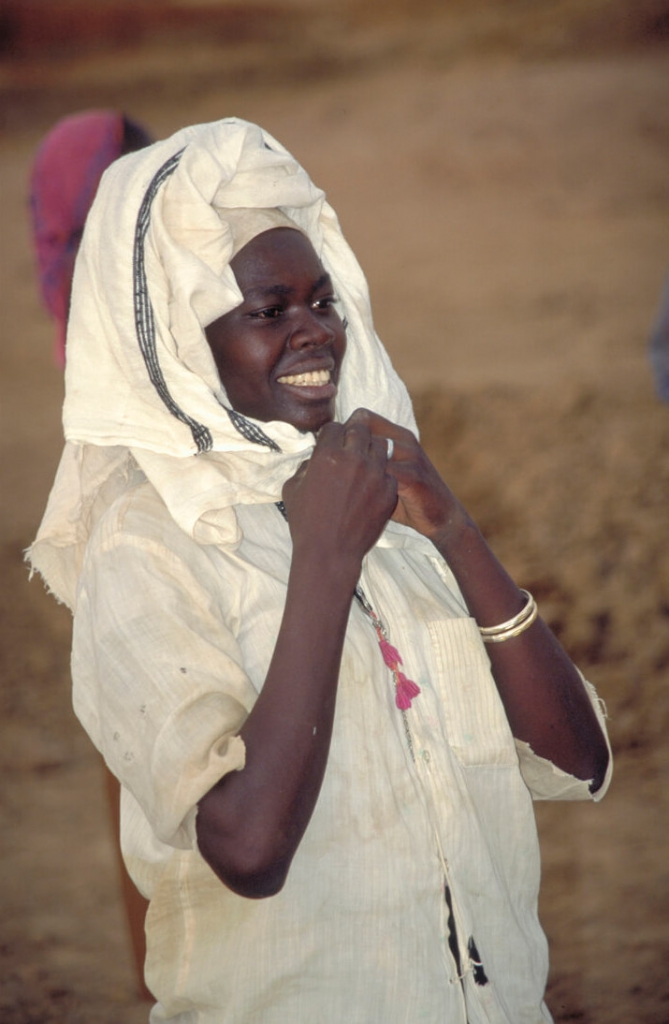
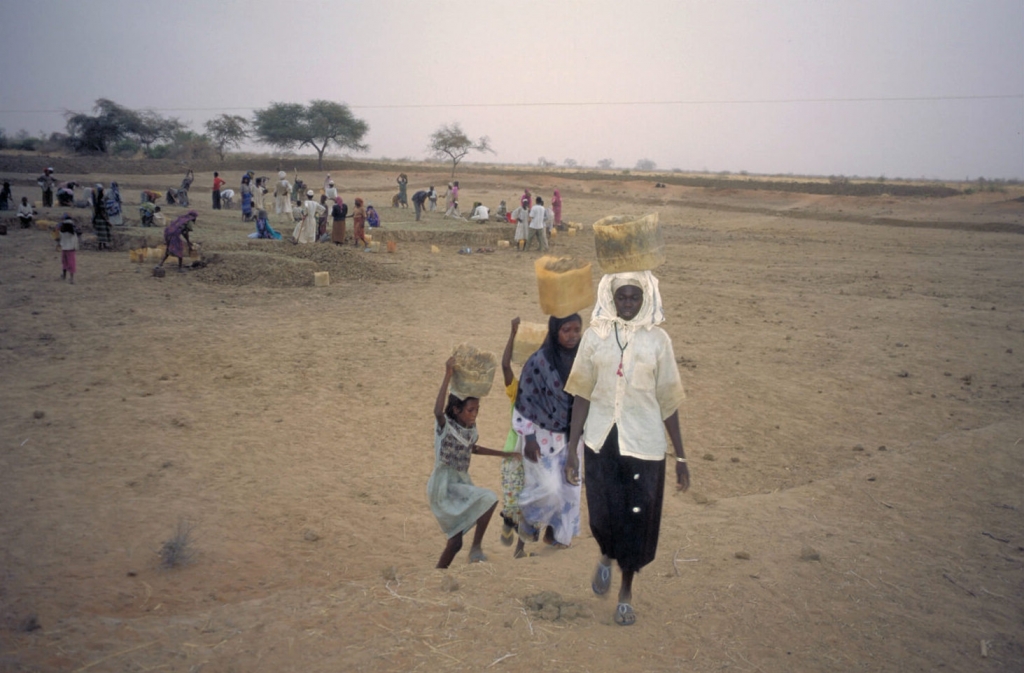
No seeds, no sesame
Their rhythm is synchonise so that when she walks to empty the earth on the edges of the reservoir Bakhita is always with girl friends of her age with whom she can speak of the things and people of interest to them.
The hafir is being build near the fields, and it could make it possible for Mohamed Khamis to cultivate more than the five mukhamas (8.75 fedans) he does now. He finds the work too hard to use sufficient land that would bring home enough bags of sorghum for his family to use during the entire year.
Again last year there was crop failure when the rains were insufficientto harvest enough for their needs. The family got seven bags of sorghum (30 malwas – 90 kgs) and the ground nuts which, in the past, were an important family-income producer are now less the 3.5 kgs. “There is so little that the boys eat it immediately,” Mohamed Khamis says.
They did not plant sesame because they had no seeds. And the few gum arabic trees that grow are not worth tapping. Now karkade is the family’s most important cash crop. They harvest it from November until to February and it is always in demand as it is the country’s favourite drink taken hot as tea or as a cold refreshing drink and the one served to the guess.
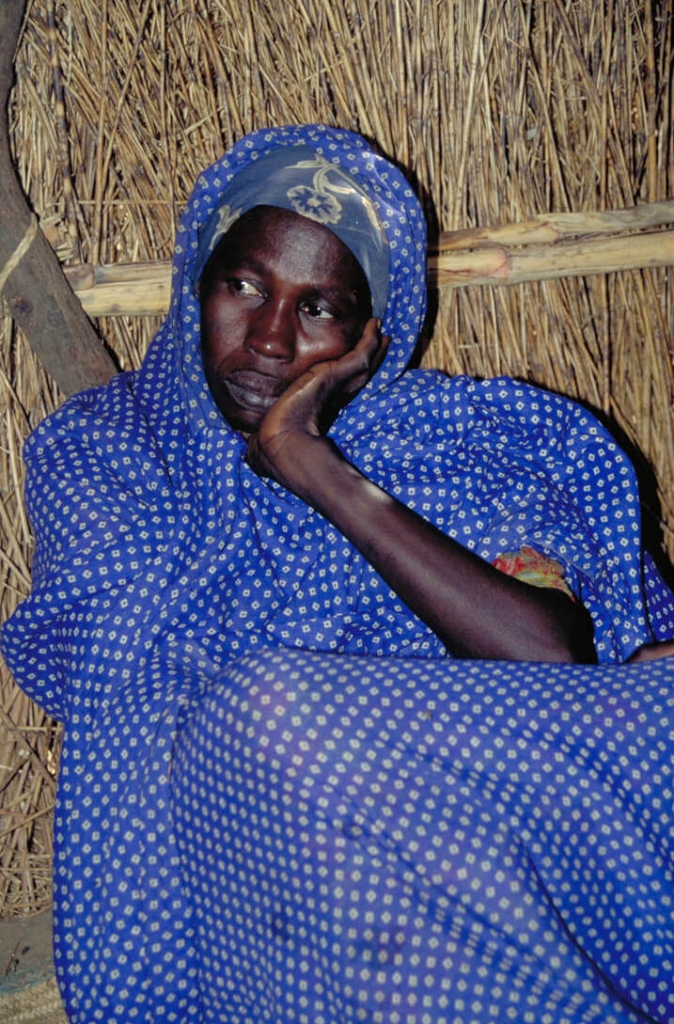
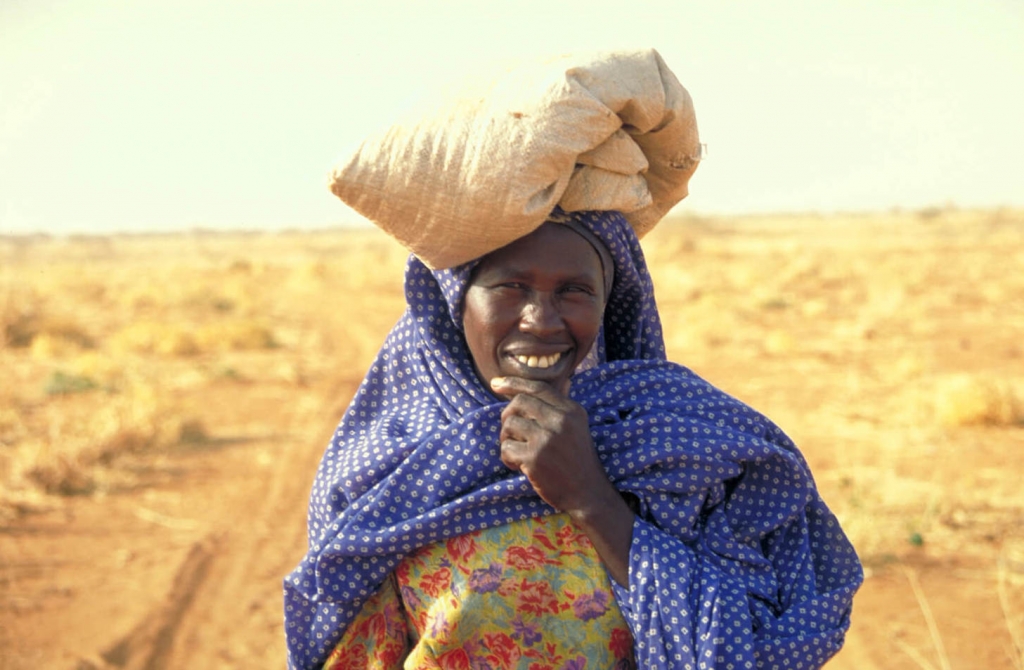
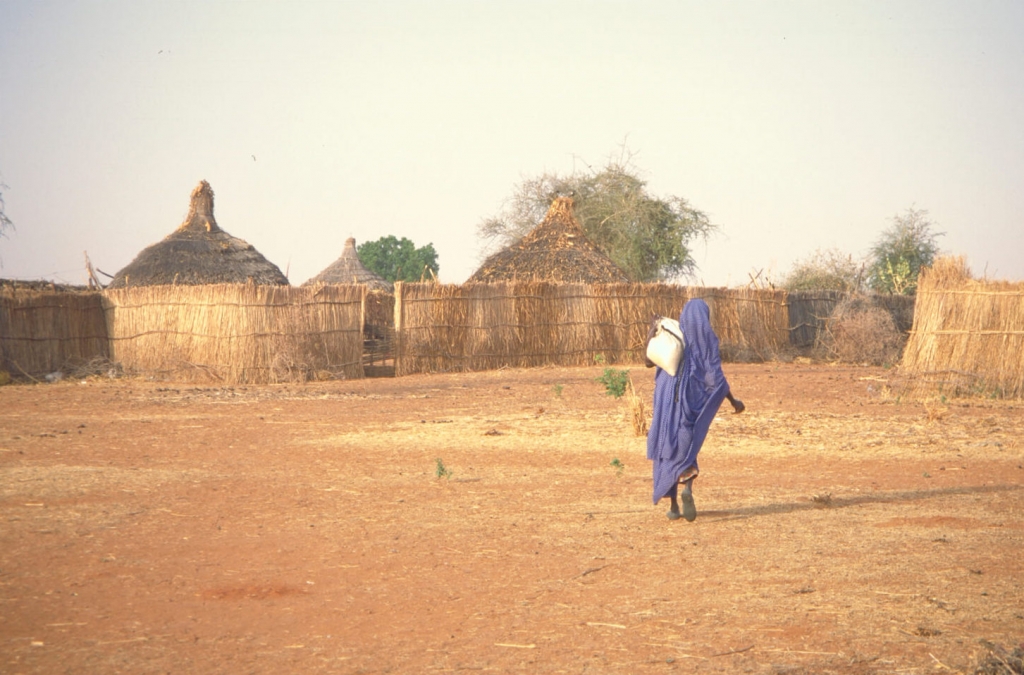
Faith and energy flagging
But there is another incentive for everyone who joins in the construction of the hafir. At this time, it’s most important because the villagers who work in constructing the hafir get their wages in food. It is given to them from World Food Program’s (WFP) Food-for-Work program.
The first delivery of food has just arrived and this afternoon the first distribution will take place. Just in time, because the shipment was later then expected and people’s faith and energy was flagging. Their dignity needed a boost.
8.20 The miler is late. He is sick Omum is told. She hopes he will come, if not she will have to walk another two hours to find the next mill. She puts her bag in line and goes to a tea-shelter where a woman serves tea and karkade to the crowds that gather every day around the pump outside the village of El Jimhizi.
Her life is marked by references she cannot forget.
As the majoritiy of the water pumps of the region, the ones of El Jimhizi are a result of a big international relief program which came to help the dying people after years of devastating drought. That was a time when skeletons of dead people and their animals lay all over the region. When the lucrative gum arabic trees dried up and starvation hit all of North Kordofan. Omum Eid El Riah cannot tell what year that was. She does not know her age and those of her children. Her life is marked by references she cannot forget.
“That was the terrible drought and it was the following year Adam was born,” she says. It was a year when all the men had gone to work in Gezira, situated between the Blue and the White Niles, the land is rich and the government has large cotton and wheat farms. That was also the year the ferry-boat sank crossing the Nile and the year the lorry that was bringing the villagers turned upside down and some died. Omum remembers well, her father and mother were in the truck.
The numerous pumps make El Jimhizi a lively place. For women and girls the pumps brought an end to their eight-hour daily walk to the find water. The nomadic pastoralists are here in great numbers and as they pay to use the waterpumps it brings trade to the village. For Omum’s son El Fatih, who often comes here to picnic and enjoy the different crowds coming from all the villages around. It’s a change for the teenagers who do not dare go much further. They all remember their two friends who had gone to find work in the capital and are now dead. To adventure into the big cities means they can be forcibly enlisted into the army for the adventures of war.
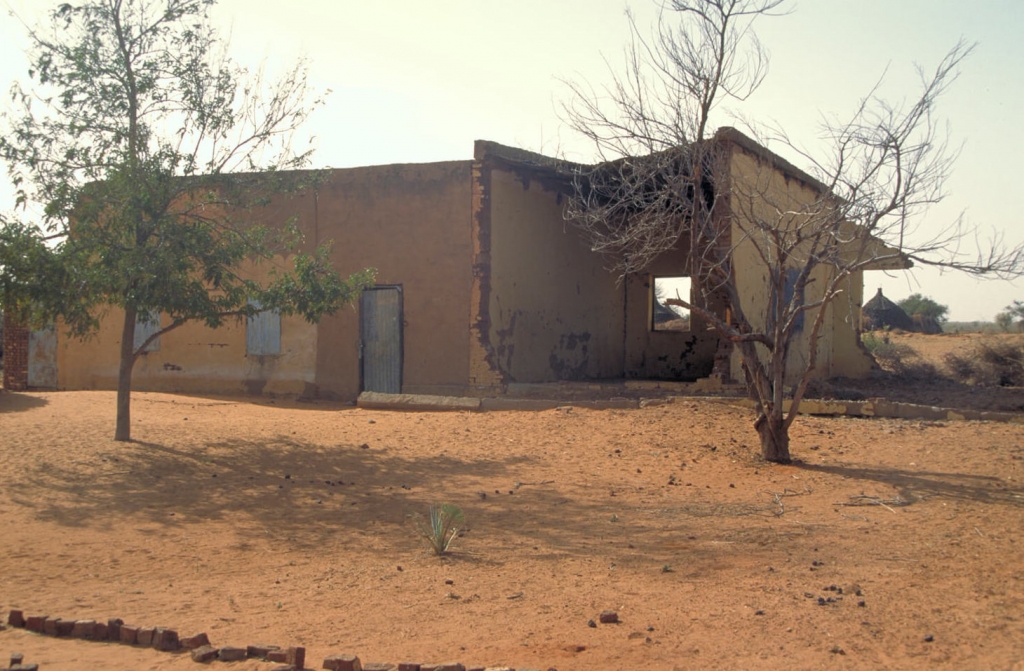
He cannot explain why the war
As with most men in the village, Mohamed Khamis does not want his sons to go to the city and the boys do not want to go either. Adam and Harron were allowed out of the village only if they looked for work on farms and far away from towns.
Their country has been more than over 30 years in civil war. North Sudan where Khartoum the capital and government are located are fighting over Southern Sudan. After so many years the reasons for the war have varied and multiplied and now Mohamed Khamis cannot explain clearly why it keeps on for so long. He knows that in his country there are more than 600 tribes and many have always been in war with each other.
But their Iwamaa tribe, he explains has never been in war with anyone.They have never had a nomadic life that brings contacts with other tribes and more reasons to get into conflicts. They have kept to villages of their ancestors working the land their chief has given them in the center of the country. And even now that the desert is coming in on the village and that the earth is getting drier every year, they do not want to go away from their land.
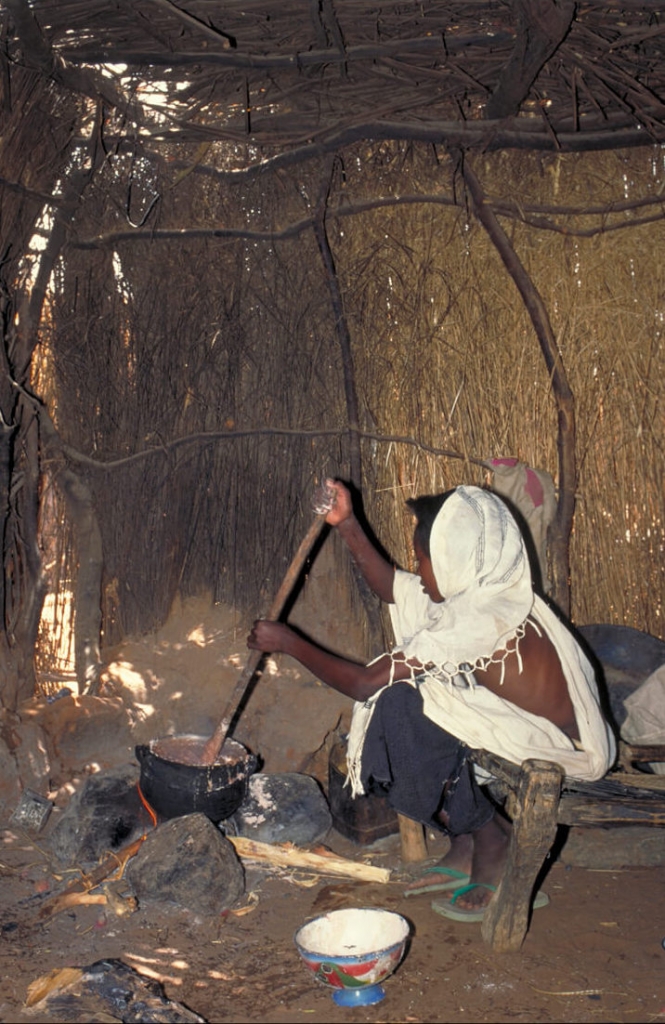
It’s natural for girls to do all the work
11:00 Amna came back from the well partly walking, partly jumping on the back of other’s donkeys to catch a ride. One of the boys had taken hers because his was to heavily charged. The rest of the morning hours’s duty has been to watch over the smaller children. Now they are all in the kitchen hut where she is preparing the sorghum her mother has brought back after finally getting it ground. Omum’s daughters cook and do all the housework as she did when she was a child. She says it’s natural for girls to do all the work.
Her eyes shining with intelligence, wit and humour, Amna knows it is not true when she sees her mother points her finger to her head to say her daughter has nothing in her brain. She also stays silent when marriage comes into the discussion. Her sister Bakhita is 15 and her mother is already worried because no man has come to request her. “If a man comes tonight to ask for her, I give her,” she says. When a man comes to ask for Amna she will give her too.
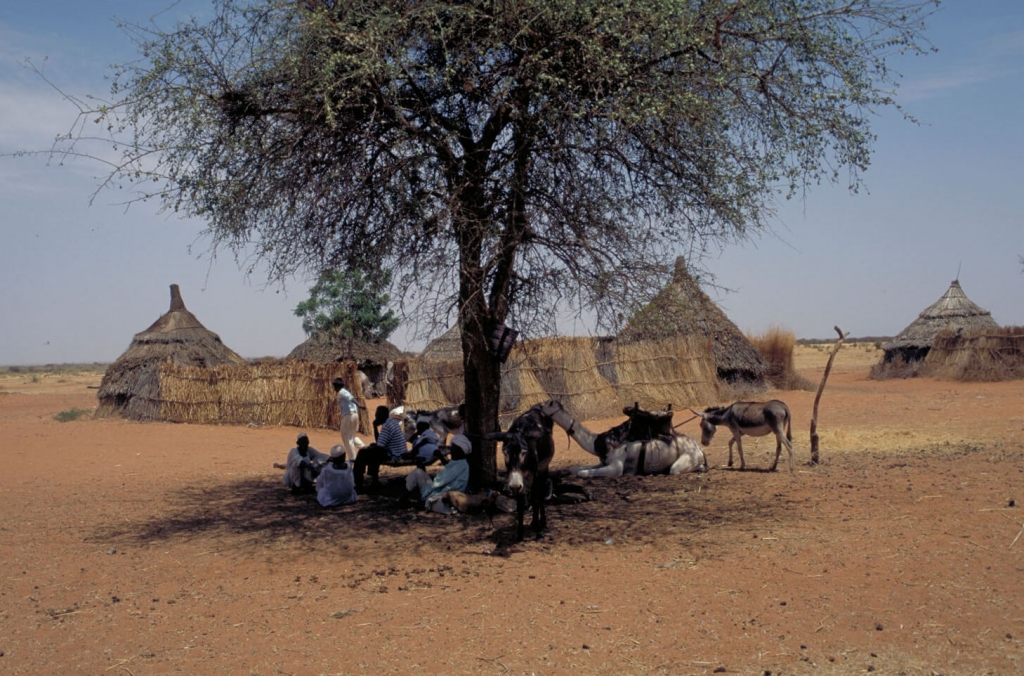
No one has primary school
As the hens and chickens dig at the sand around the huts looking urgently for a cool place, the villagers return with the same urgency from the hafir. At the market Mohamed Khamis sits under a tree with many other men he regularly meets during market day. Not far he can see the two beds. If someone wants to buy, they will know where to find him.
Omum, Bakhita and El Fatith welcome the shade in the almost unbearable heat of the midday sun. As tea was a light breakfast for the work accomplished they (appreciate) the meal of sorghum Amna serves them and the following well deserve rest.
3.30 p.m. The hottest hours of the day have passed resting. “People with wells have much more time to do nothing then we,” explains Omum, making her way with Bakhita for the afternoon shift. They will pick and shovel and carry their load until sunset.
Elzibair stays home, his throat is swollen because of tonsilitis. El Fatih, the family member registered as chief of the group, goes to receive his team’s food. Djohame’s 75 households are represented outside the two huts where the distribution takes place and all seem impatient to hear their name called. Everyday, the work each group does is measured and food is given according to the work done. For El Fatih’s family two bags of sorghum and two jerricans of cooking oil were a pressing necessity.
The old ones sit under the surrounding trees, as the younger men pass over the heavy bags and help to load the waiting donkeys. They know that in other times they would be off studying or working in the cities making bricks or selling water. It is custom for the “big sons” to bring income to the family in the village.
In our village they say there are good artists, poets, singers and song-writers, they say proudly. No one in the village has passed a primary school exam for the last seven years which would allow them to attend secondary school. Half of the school situated in Abo-Hermaira, a 90-minute walk, has fallen down because of lack of care. School fees have been raised leaving education accessible only to the rich and because they do not receive their salaries, the teachers are not coming to the village school
El Fatih and his friends’impossible access to education they admit is one of the many negative impacts of war. It is no more a secret, they all know the money goes for war. The war, they say, makes it impossible for us to get out of our poverty. Villagers, young and old are asking that the war ends and that the money go for peace.
Losing five of their friends to war, they consider is enough. They all wear their “haijap”, the good-luck charm that assures that Allah will protect you, your family and your fields. But they wear them with a certain irony and disbelief: “The man who makes the good-luck charmshas been caught by the police and is in jail,” they say, laughing trying to keep their sense of humour despite the lack of faith.
Djohame is my village
4:30 Mohamed, coming back from the market, makes a detour to stop in Gajaour-El-Ilaidat, one of Djohame’s six sub-villages. He wants to visit his sister whose daughter has given birth for the first time. The baby is not well and the too-young mother not much better. She has not enough milk and no one is sure the baby will live. They cannot afford a stay in El-Obeid the nearest city to see the doctor and do not seem to beleive much can be done. All Mohamed’s family came to build this village to be nearer to their fields. They do not understand why their brother does not move there to be with them.
But Mohamed Khamis stays silent as if there are secrets he does not want to reveal, or discuss. Being a “mother village” Djohame has easier access to the lorries that brings him out of the village and into the markets. “Djohame is my village,” he says. “I have been given land here and this is enough for me.” That may be good for Mohamed but not so good for Amna. Djohame does not have a waterpump as Gajaour does, and research has confirms there will never be water here.
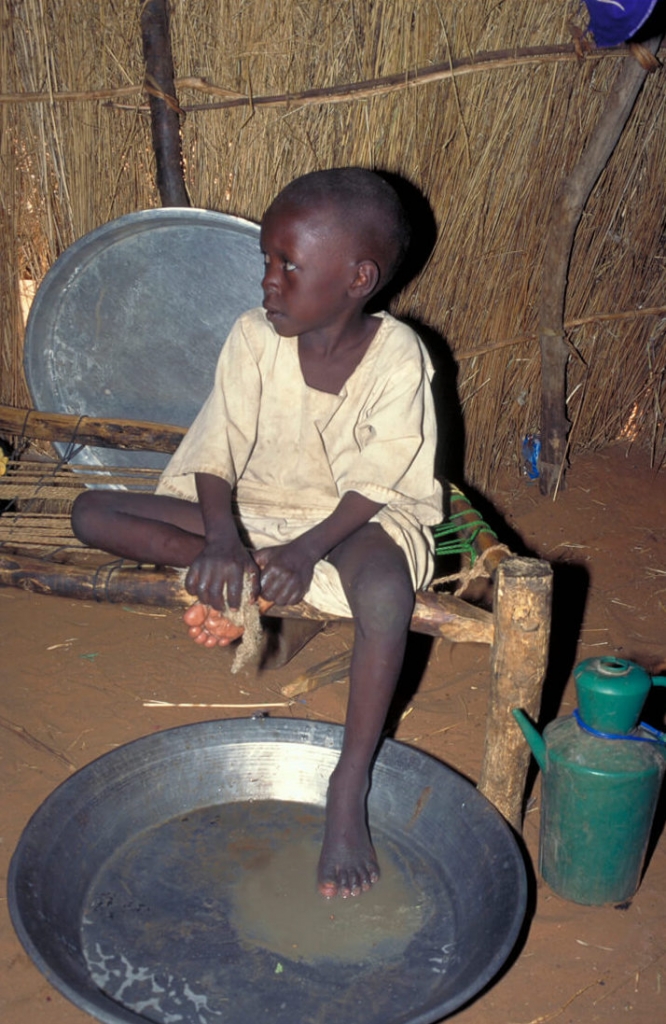
The arid savannah
So the donkey, carrying the empty jerricans and Amna, full of courage, make their second trip to the well so she can be back beforedark. Omum leaves the hafir to fetch fire-wood on her way home. Dry branches of the small bushes that cover the arid savannah is all that can be found and, as the dry season advances, so is the distance to find it.
When Mohamed Khamis wants wood to build his beds, he must go further west over the mountains that can be seen on the horizon. He says he knows that trees should not be cut and it is one of the reasons the desert that covers the country just north of their province is advancing more and more each year. There is a road being build across the mountain forest and the fallen trees are available to those who go and get them, he says.
Women make perfumes
6:30 Darkness sets in and the fire is warming the sorghum again but this time it’s Bahkita’s large wooden spoon which spreads the sorghum to make a pancake-like dish that will be eaten with okra and spicey sauce. Mohamed Khamis enters the courtyard and goes to sit with El Fatih on one of the beds set under one the four trees. All the trees are small, despite the years they have been there and are hardly useful for shade. There are two El-Oushar trees, nature’s sign that drought has hit this land. As if there is always life that feeds from disasters, it is the only tree which survives and grows in the middle of drought and the small Laloup still too small to bear fruits.
Then there is one Kirwie (castor oil) tree whose seeds produce oil which is poisonous when not treated and if used elsewhere as a stomach medicine. In Sudan it is used to oil the hair. Women here like to make perfumes, and body oils as does the new wife of the local imam who is happy to show other women her knowledge.
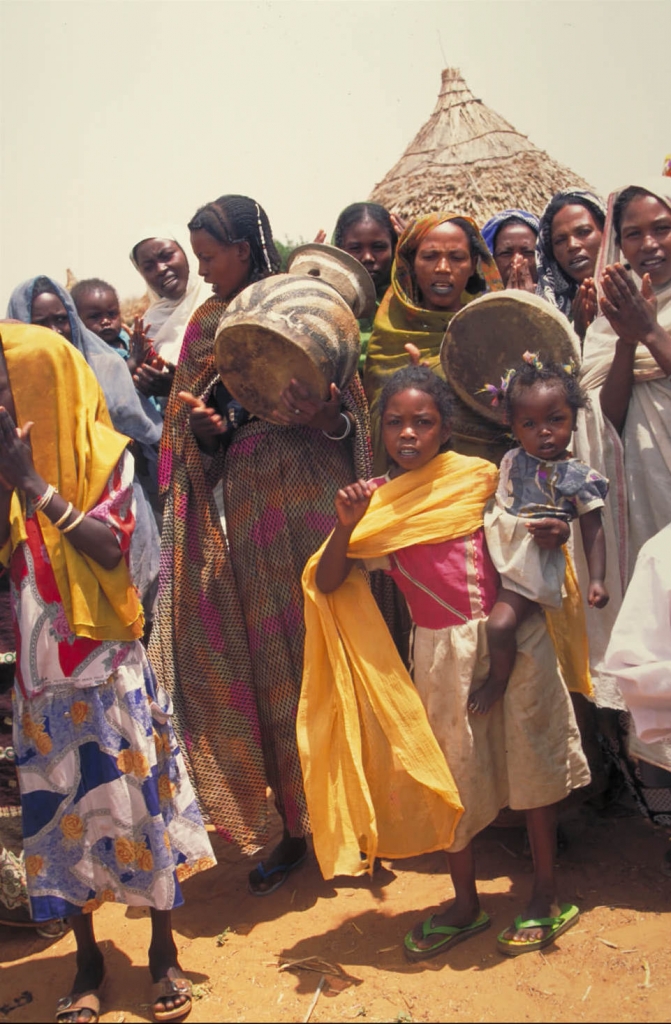
“Tasba Alakheir,” (sleep well) they say to the ones leaving the dancing ground.
One drum, one plastic container and a party
7.30 After dinner served on a mat in the yard, Bakhita and two of her friends sit outside the house walls, between the donkey and goat areas and begin to drum. One drum and one plastic container is enough. Their call is heard and slowly the villagers come to join in. It is the girls who play the music and sing. All through the evening, the hafir workers stop by on their way home. Some are there until midnight, others begin at three in the morning. It’s full moon and they take advantage of the night’s natural light and its coolness to continue their labour.
Some parents take advantage of their young ones absence to visit their empty huts together. Dancing is for the young people. Boys answering the girl’s songs, girls inviting boys to sing. The best one is applauded.
It’s the first joy since the beginning of the hafir building. “We come home too tired,” says Omum, “we cook and we lay down to sleep.” But young people are the last one to join their family, laying under a starry sky, a perfect night.
